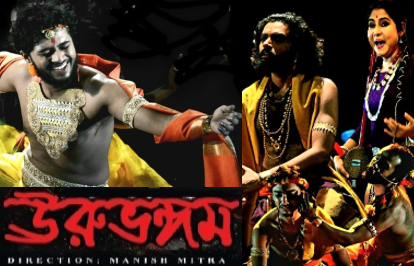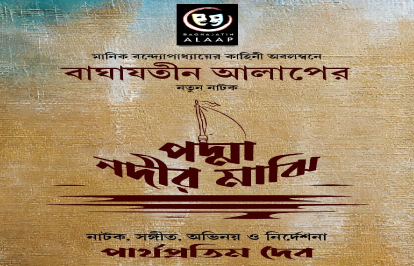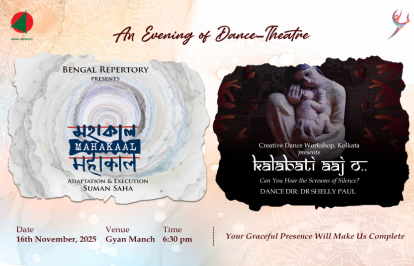
রামানুজন
- 18 Nov, 25
- 06:30 PM - 08:30 PM
- Tapan Theatre: Kalighat
- Ramanujan is a poignant and layered dramatic retelling of the life of Srinivasa Iyengar Ramanujan, a mathematical genius whose journey from the humble town of Kumbakonam to the hallowed halls of Cambridge became a testimony to the mystic convergence of faith and intellect.
- At the heart of the story lies Kamallatammal, Ramanujan’s devout and determined mother, whose unwavering belief in the Indian Knowledge System and ancient Vedic wisdom shapes her son’s destiny. A woman of deep spiritual insight, Kamallatammal was convinced that her son’s mathematical gifts were divine in origin—bestowed by Goddess Namagiri. She believed that only a sinless, spiritually disciplined life would unlock the hidden mathematical truths buried in the sacred Vedas. So deep was her conviction that she even chose a shortened lifespan for her son in return for the fulfillment of his divine purpose—to rediscover the lost formulae of ancient Indian mathematics and illuminate the world.
- Kamallatammal introduced young Ramanujan to the world of classical Indian Mathematics, where texts such as Bhaskaracharya’s Leelavati sparked his curiosity and reverence for numbers. The poetic elegance, problem-solving spirit, and philosophical depth of these works became the unseen foundation of Ramanujan’s intuition-driven mathematics. His mind absorbed not just numbers, but the spiritual essence encoded within them—an echo of India’s ancient wisdom.
- Parallelly, the drama explores the emotional turmoil of Janaki, Ramanujan’s young wife, whose loneliness, longing, and silent suffering unfold in the backdrop of his spiritual quest and academic ascent. Her story mirrors the sacrifices often demanded of those tethered to greatness.
- The narrative takes a pivotal turn when Professor G. H. Hardy, an English mathematician at Cambridge, receives a mysterious letter filled with unconventional theorems and identities. Intrigued and awestruck, Hardy becomes not only Ramanujan’s academic collaborator but also his friend, philosopher, and guide, navigating the chasm between empirical Western rationalism and Ramanujan’s intuition-driven, God-inspired mathematics. Their bond—both intellectually rich and emotionally intense—serves as a bridge between two worlds.
- Threaded throughout the drama is a compelling contrast between Indian spiritualism and Western materialism, with scenes juxtaposing Vedic meditations with the rigors of formal proofs, faith with logic, intuition with reasoning. The drama invites the audience to reflect on the Indian Knowledge System—its reverence for the sacred, its integration of science and spirituality, and its potential to shape modern knowledge if rediscovered and respected.
- At its emotional and spiritual core, the drama reveals how Ramanujan’s life revolved around three women—Goddess Namagiri, his mother Kamallatammal, and his wife Janaki—each embodying faith, destiny, and love in their own profound ways.
- Though Ramanujan died young, his legacy transcends time. Today, his work in number theory, infinite series, modular forms, and mock theta functions continues to influence cryptography, string theory, black hole physics, and cutting-edge fields in computer science and artificial intelligence. His insights, many of which were derived from dreams and devotion rather than deduction alone, demonstrate that the boundary between Mysticism and Mathematics is thinner than we think.
- Ultimately, Ramanujan is more than a biography. It is a spiritual and philosophical voyage into the soul of a man who, guided by divine vision and maternal love, unveiled eternal truths that transcend time and geography. His life stands as a testament to the idea that true knowledge is not just calculated—it is revealed.
- In an age dominated by data and algorithms, where education is often reduced to information and utility, Ramanujan reminds us that true knowledge is rooted in intuition, humility, and a deeper connection with the universe. This drama is important today because it rekindles respect for India’s ancient intellectual traditions, highlights the value of inner vision over mere academic rigor, and inspires a new generation to see science not as separate from spirituality, but as a sacred pursuit of truth.
Venue: Tapan Theatre
-
Premium @ ₹400
Stock:: 18 seats
-
General @ ₹200
Stock:: 17 seats
Premium₹400
General₹200




